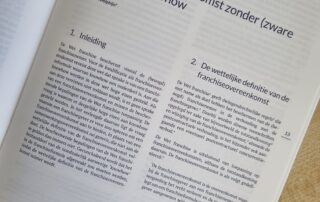How is the (sub)lease agreement concluded?
As is well known, tenancy law is largely subject to (semi) mandatory law. This means that the landlord and (sub)tenant are bound by the system of the law with regard to numerous mutual rights and obligations. However, does this also mean that a rental agreement has only been concluded when there is a signed rental agreement?
This question has recently come up in court. The parties in question signed a letter of intent with regard to the relevant space, the applicable lease term, the date of commencement of the lease and the level of delivery to be offered by the lessor. The letter of intent has also been signed as “tenant” and “landlord”.
When the parties have reached agreement about the rental conditions in this way, this means that a rental agreement has indeed already been concluded. A signed agreement, with accompanying general terms and conditions, is therefore not necessary for this. The fact that the said letter of intent qualifies as a ‘rental declaration’ does not matter for the presence or absence of a fully-fledged tenancy agreement.
Incidentally, it is good to realize that there is also a “sub” tenancy agreement when the (sub) tenant actually uses the rented property, as made available by the landlord. It does not matter whether there is any form of written agreement. A rental agreement can already have been concluded through the conduct of the parties. This often occurs in franchise agreements where business space is simply made available to the franchisee/subtenant. In many cases, there is not a formal, written, (sub)lease agreement. Nevertheless, it does indeed exist between the parties. The same can be said for a franchise agreement. If this has not been concluded, but the parties do behave in accordance with it and if they continuously observe all rights and obligations, as is known between each other, then there is indeed a fully-fledged franchise agreement.
It should be clear that the franchisor and franchisee would be wise to properly record both the franchise agreement and the (sub)lease agreement, with associated general terms and conditions, before getting started. This prevents unnecessary interpretations and possibly even problems during the ride or afterwards.
Ludwig & Van Dam franchise attorneys, franchise legal advice

Other messages
Continued activities of the franchisee do not violate a non-competition clause
A judgment was recently rendered in preliminary relief proceedings in ...
Car dealer wrongly not a franchisee?
The Franchise Act entered into force on 1 January ...
Suspension of payouts allowed by the franchisor
The District Court of Limburg ruled on 30 March 2023, ...
Franchising is on the rise: ‘There is still a huge amount of room for it in the Netherlands’
An interview with mr. AW Dolphijn about franchise. De Beren, ...
The franchise agreement without (heavy demands on) know-how
In the 2023-1 edition of Contracting magazine, I published a ...
Standstill period violation
On 15 March 2023, the District Court of Noord-Holland, ECLI:NL:RBNHO:2023:2636, ...







